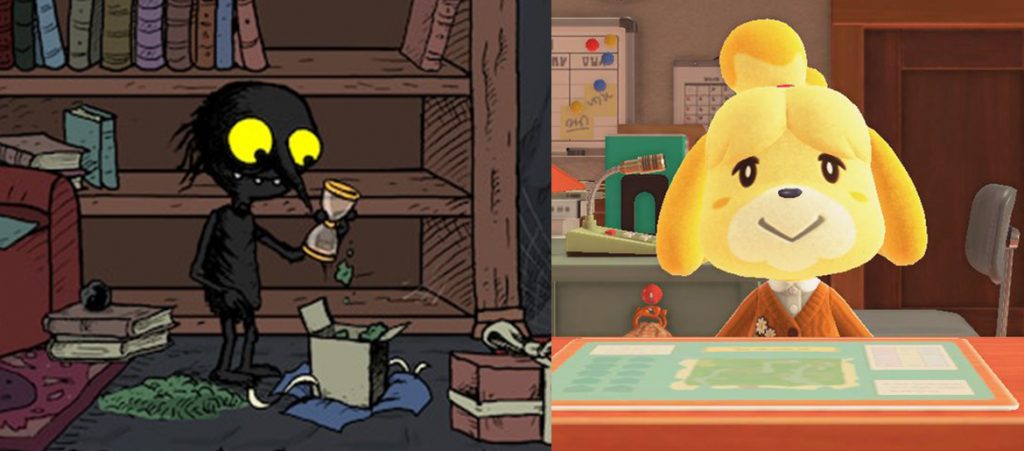
In a fast-paced world filled with deadlines and responsibilities, it’s no wonder we spend our downtime seeking solace and respite any way we can get it. Enter: cosy games. With their enchanting settings, gentle challenges, and soothing aesthetics, cosy games have become a beloved outlet not just for the kids they were intended for, but for grown ups seeking comfort, joy, and whimsy. There’s more to this gaming genre than simple escapism, though – cosy games are quietly training us in the vital skills necessary for life in the 21st Century.
What’s a cosy game?
Cosy games, also known as “comfort” or “wholesome” games, are characterised by their warm and inviting atmosphere. You’ll know the big ones: Animal Crossing and The Sims. These games often feature charming visuals, serene soundtracks, and gameplay mechanics that encourage relaxation and exploration. Although originally targeted at teens and tweens, cosy games increasingly provide a sanctuary for adults looking to escape from the stress and intensity of our modern world.
The roots of cosy gaming can be traced back to beloved classics like The Legend of Zelda, where players embarked on epic adventures filled with puzzles and exploration, or the adorable farm simulator, Harvest Moon. But the genre became clearly defined in the early 2000s, with pioneering titles The Sims and Animal Crossing allowing players to create their own virtual worlds and nurture relationships with charming characters. By the mid-2000s, another cosy gem entered the scene: Diner Dash. The goal of the game is distinctly cost – serve customers and keep them happy – but it introduced a new dimension to the genre, proving there is room for warmth and comfort in the most bustling environments.
Unsurprisingly, cosy games experienced a huge surge in popularity during the pandemic. With people seeking comfort, connection, and an escape from uncertainty, cosy games became a soothing balm. They also offered a unique opportunity for social interaction during a time when physical gatherings were limited. Online multiplayer features allowed friends and family to come together online, visiting each other’s virtual towns, sharing experiences, and fostering a sense of togetherness despite the physical distance.
Finding out that sad Zelda ad about the depressed businessman was based on an actual review on Japanese Amazon 😭😭😭 bro my heart
— overflow (@mofumofucosplay) May 11, 2023
Cosy games, therapy dupe
With stress and anxiety still dominating the lives of young adults post-pandemic, could cosy games be the therapy dupe we need in this economy? Dr. Rachel Kowert, a renowned research psychologist specializing in gaming, says they do actually have therapeutic qualities. “Well-designed games will meet our basic needs as humans. That means they give us a sense of autonomy, a sense of relatedness, and a sense of competence,” she explained to Shondaland. “Those are all connected to psychological well-being.” The immersive and gentle nature of these games can promote relaxation, reduce stress levels, and improve overall mood.
One of the major positive effects of cosy games is their ability to evoke a sense of comfort and safety. The serene environments, soft colour palettes, and soothing soundtracks literally create a cosy (duh!) and safe atmosphere. This environment encourages a state of calm and tranquility, allowing individuals to decompress and unwind after a long day surviving in the real world. It’s tough out there – but within the game, life is easy.
That doesn’t mean that cosy games are devoid of conflict. They include challenges and stressors, but these look completely different to the stereotypical combat-heavy games. Instead of slashing through enemies or blowing things up, cosy games often give you more conceptual obstacles to tackle. For example, indie game The Stillness of The Wind. You play as an elderly woman on a farmstead who busies herself growing food, churning cheese, and harvesting mushrooms until… well. You can probably guess. Through this quiet and contemplative journey, the game delves into themes of life, loss, and the human experience in a hauntingly beautiful and introspective manner. Or My Time at Portia, where you craft, explore, and interact with quirky characters to rebuild society after an apocalyptic event. These games still offer a sense of accomplishment, but it’s more about personal growth, creativity, and finding joy in the little things.
These challenges are a breath of fresh air in the gaming world, which is still dominated by combat-heavy role-playing games (RPGs) like Call Of Duty, Grand Theft Auto, and Halo. These games foster and normalise aggression between players and streaming audiences, creating an environment that prioritizes conflict resolution through combat. It influences real-world behavior and attitudes – just scroll through the comment section of any gaming streamer and you’ll see exactly what I mean. The intense and immersive nature of these games, combined with the interactive nature of the gameplay, can reinforce aggressive tendencies and combative mindsets. Honestly, it might do some men a lot of good if they switch over to cosy games to wind down. Pick up a (virtual) watering can instead of a (virtual) machine gun at the end of a long day! Let yourself be cute – you might feel better!
In stark contrast to the traditional RPGs, the accessibility and inclusivity of cosy games plays a vital role in their evolution. With intuitive mechanics and a non-competitive nature, the genre has a broad range of fans; a sanctuary for female, queer and non-binary gamers in an industry that can be dismissive, exclusive and misogynistic. After all, many minorities already face aggression and violence in our everyday lives – why would we want to come home to experience that all over again?
Streamers like CozyGamerKat, WitchTQ and PlayWithMae are leading the charge by embracing cosy games on their channels, showcasing the fun of gaming while providing a welcoming and inclusive community. Cosy game streamers not only entertain but also inspire others to find comfort and joy in the genre. It’s fun, slower paced and low stakes, reminding us that gaming should be about enjoyment for everyone.
@cozyteagames The Longing taught me to take time to be present in the moment #cozygames #cozygamesforpc #cozygaming #cozygamer #gamergirl #wholesomegames #puzzlegame #relaxinggames #chillgames #cozygamesforswitch #nerdtok #fyp #indiegamedev #indiegame #indiegaming #pcgaming #thelonginggame ♬ Clair de lune/Debussy – もつ
Training resilience and contentment
Indie game creators are also pushing out cosy games that have you thinking about more than just high scores and button-mashing; they invite you to ponder life’s deeper questions, experience profound emotions, and explore the vastness of human existence. The Longing an indie adventure game where you control a creature called a Shade, who is tasked with waiting for 400 days (in real time) in an underground cavern. There is no ‘goal’ other than to wait for the 400 days to countdown – in the meantime, your Shade can contemplate existence, explore the environment, and make choices that impact the outcome of the game. The game explores themes of time, patience, loneliness, and the journey to purpose and companionship… In five years of therapy, I’m yet to discuss half of those themes!
Whether it’s tending to a virtual garden, solving charming puzzles, or immersing ourselves in a tranquil narrative, cosy games teach us to embrace contentment. They remind us that there is value in completing mundane tasks over and over again, embracing stillness, and relishing in the tiniest, most arbitrary of rewards. That’s really what most of life is like – small, mundane and quiet. Cosy games are an invitation to find joy in these almost-boring things, and hopefully learn to apply that mentality to our offline lives. It’s something we don’t do enough of.
Whether it is exploring Hyrule in “The Legend of Zelda,” building dream homes in “The Sims,” cultivating friendships in “Animal Crossing,” or managing bustling diners in “Diner Dash,” there is solace and delight to be found in cosy games. In a world filled with chaos, these games offer a safe haven, a place where adults can embrace their inner child and find peace and contentment. They remind us that gaming can be more than just entertainment; it can be a source of comfort, inspiration, and hope.




Comments are closed.